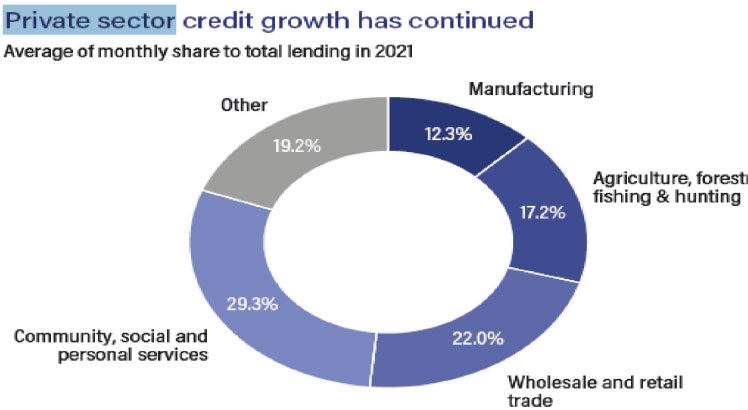Credit to private sector picks up
Credit to the private sector is on the rise with latest figures from the Reserve Bank of Malawi (RBM) showing that it expanded by 19.4 percent in the second quarter of this year.
This compares to a 15.2 percent growth registered in the first quarter (Q1) of this year, according to the RBM Second Quarter Economic Review Report published on Monday.
When compared to a similar period in 2021, private sector credit grew by 26.9 percent in Q1 before dropping to 27 percent in the Q2. Credit to the private sector further dropped to 21 percent and 18.6 percent in Q3 and Q4, respectively.
The RBM report shows in Q2 of this year, private sector credit increased by K124.5 billion to K927.1 billion.

Reads the report in part: “This development was driven by all the categories of private sector credit, namely foreign currency denominated loans, commercial and industrial loans, individual and households loans and mortgages which expanded by K48.2 billion, K46.9 billion, K29.4 billion and K2.1 billion, during the second quarter, respectively.”
Speaking in an interview on Monday, Catholic University of Malawi economics lecturer Hopkins Kawaye said the trend is good for the economy, but cautioned that for the country to register real economic growth, credit should go to growth-oriented sectors.
“What remains crucial is for us to also assess the increase in credit to government because even if credit to private sector expands, but the same to government is still higher than credit to private sector then the excessive government borrowing would still crowd out the private sector borrowers,” he said.
Kawaye called for critical evaluation of the composition of the sectoral distribution of the credit, adding that credit needs to go to the sectors that grow the economy compared to retail and wholesale sectors.
Indigenous Businesses Association of Malawi president Mike Mlombwa said businesses are borrowing after the slowdown in economic activity triggered by the Covid-19 pandemic.
He, however, said the development could also be due to the fact that most businesses are still struggling due to high interest rates hence increased borrowing to finance their daily obligations.
In terms of economic sectors, the RBM report further shows that the private sector credit increases were recorded in agriculture, wholesale and retail trade and manufacturing, which rose by K33.4 billion, K29 billion and K27.4 billion in that order.
On the other hand, community, social and personal services; electricity, gas, water and energy; restaurants and hotels; financial services; transport, storage, and communication; construction and mining sectors recorded increases of K10.8 billion, K5.9 billion, K4.9 billion, K3.6 billion, K2.6 billion, K2.4 billion, K214.7 million respectively.
The report showed that community, social and personal services sector continued to hold the largest share of outstanding private sector credit, followed by the wholesale and retail trade and agriculture, forestry, fishing and hunting.
This notwithstanding, the data shows that the share of the community, social and personal services sector in the outstanding private sector credit declined to 30.5 percent during the second quarter from 33.5 percent in the first quarter.
In contrast, the share of wholesale and retail trade, agriculture, forestry, fishing and hunting and manufacturing sectors increased to 23 percent, 17.6 percent, and 11.6 percent from 22.5 percent, 15.9 percent and 9.8 percent during the first quarter of this year, in that order.
Meanwhile, the RBM data shows that credit to the public sector (central government and state-owned enterprises) rose by K131.1 billion during the second quarter, following another increase of K132.7 billion registered in the previous quarter.





